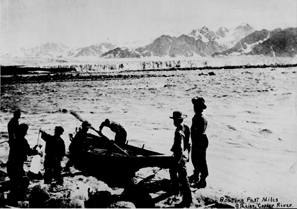

Preparing to pass Miles Glacier on the Copper River, 1898
WE thought to have passed the rapids by night and to be far down the river below the glacier. So loading our goods into our boats, and leaving the tent and stove behind which did not belong to the two men, we began roping our boats down the rapids.
We had 150 feet of rope attached to each end of each boat, and several men to a boat. The work was slow. The banks were steep, and many of the rocks over which we had to climb were ten to fifteen feet high.
Often as the boats drifted down the current, our ropes would get caught under some rock, and it was with great difficulty that they could be removed.
We frequently came to places where we dared not venture to leave our goods within the boats, lest they should be capsized and the goods lost, so they were unloaded on the bank, and the boats held back until the full length of the line was carried down stream, when the boats would be pushed out into the current to shoot through. If they capsized, we lost nothing, which happened more than once.
We had, of course, to pack our goods over these stretches, and then reload them, and go forward, until another bad place was reached, when the same thing would be repeated.
Sometimes it was necessary, in order to clear some projecting rock, for one or two men to ride down in the boats. This was no desirable job, but some one had to do it. Many men have attempted to "shoot" these rapids, but few have lived to relate their experiences during its passage.
The river here is confined to a width of one hundred and fifty feet, and for three miles its immense volume of water rushed down at a tremendous rate; besides, the whole bed of the stream is filled with rocks, over and around which the water lashes itself into foam, with a noise almost equal to the roar of the great Niagara. . . .
We worked hard the entire day, and when night came had only made two miles. The shore along which we then were was steep, and almost one mass of rocks, which had fallen down from the mountain side.
We tried to reach a more suitable place to camp, but darkness came on, and we were obliged to stop.
We succeeded in getting a camp fire started, and prepared supper, but we could find no place to spread our beds. Some of the men tried leaning up against something, to get a little rest, but the greater portion of us were awake, and kept our fires going all night.
We prepared breakfast and had it eaten before daylight. At the first appearance of dawn we were ready to start. The weather had turned colder, and the river was still full of floating ice. About ten o'clock we had reached the last part of the rapids. For about three hundred yards it was impossible to rope our boats down the main channel, but there was a side channel down which we might go, by removing our goods and carrying them, as at several other places, sending the boats down empty.
The stream was so filled with rocks that we could not even float our boats here, without getting out into the water and pushing them off the rocks frequently. Often we had to wade in the icy cold water to our middles, and by the time we had reached smooth water we were thoroughly benumbed with cold. We did not stop to build fires and dry our clothing, but ran races up and down the beach to get warm, thinking that our troubles were now over, and that we should soon reach Alganak, where we hoped to get a fresh supply of provision for the balance of our trip.
We loaded up our goods again, and being below the rapids, got in and pulled down toward the glacier. But we were barely started when we espied two men on the opposite bank, who ran down to the water, and motioned frantically for us to go back, and we knew that something was wrong. So we effected a landing, and fastening our boats, went down to investigate.
Going close to the glacier we saw a sight which almost caused our hearts to stand still. The whole river, for four miles down, was blocked with solid ice. (Chapter 28, 161-163).